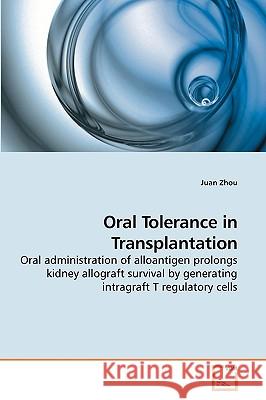Oral Tolerance in Transplantation » książka
Oral Tolerance in Transplantation
ISBN-13: 9783639222463 / Angielski / Miękka / 2010 / 160 str.
A major goal of transplantation research is to develop a specific immune unresponsiveness to alloantigen. Oral administration of antigen prior to systemic challenge has been demonstrated to suppress systemic immune responses, and this antigen specific suppression is termed oral tolerance. This book assesses whether oral tolerance can be used to prolong kidney allograft survival and investigates the mechanisms by which this survival is prolonged. The book described that oral exposure to alloantigen prolongs kidney allograft survival in rats in an allospecific manner. The prolongation is due to a generation of CD8+ T regulatory (Treg) cells in the recipient. The CD8+ Treg cells are present in the spleen, mesenteric lymph nodes and kidney allograft and able to transfer the graft prolongation to naive recipient. These Treg cells may shift immune responses towards type 2 responses and delete alloreactive T lymphocytes through Fas/FasL interaction."
A major goal of transplantation research is to develop a specific immune unresponsiveness to alloantigen. Oral administration of antigen prior to systemic challenge has been demonstrated to suppress systemic immune responses, and this antigen specific suppression is termed oral tolerance. This book assesses whether oral tolerance can be used to prolong kidney allograft survival and investigates the mechanisms by which this survival is prolonged. The book described that oral exposure to alloantigen prolongs kidney allograft survival in rats in an allospecific manner. The prolongation is due to a generation of CD8+ T regulatory (Treg) cells in the recipient. The CD8+ Treg cells are present in the spleen, mesenteric lymph nodes and kidney allograft and able to transfer the graft prolongation to naïve recipient. These Treg cells may shift immune responses towards type 2 responses and delete alloreactive T lymphocytes through Fas/FasL interaction.











